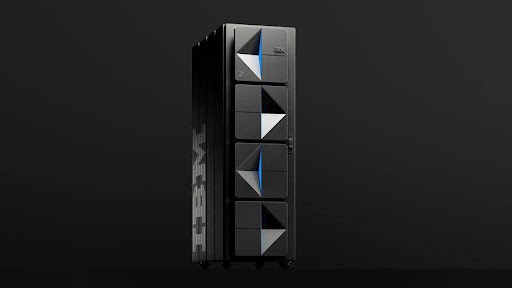IBM has announced the launch of the z17, its new generation of mainframes equipped with native artificial intelligence capabilities. Powered by the IBM Telum® II processor, the system is designed to handle not only robust transactional loads but also to operate with AI algorithms integrated directly into its core. This announcement marks the reunion of two eras of computing that are now coming together to shape the future of the financial sector.
This convergence of the mainframe’s robust past and the dynamic present of artificial intelligence is more than just a technical leap. It reflects the profound transformations reshaping the foundations of the global system. To better understand this process, we spoke with Daniel Cezar, a supply chain expert and current Corporate Purchasing Manager at Lactalis Group, who highlights the significance of this transformation. With years of experience in the industry, he views mainframes as crucial tools for optimizing the supply chain. “Companies increasingly need systems that not only ensure data integrity but also provide agility and real-time intelligence. Mainframes like the IBM z17 are helping create a new paradigm in supply chain management, especially in an era where AI underpins strategic decision-making,” says Cezar.
The concept of supply chain has evolved significantly in recent years. What was once a linear process has now become a dynamic, interconnected ecosystem that demands real-time data collection and analysis for swift and accurate decision-making. With digitalization, it became clear that integrating technologies like AI, big data, and cloud computing would be essential to manage the complexity of these new environments. This is precisely where modern mainframes, like the IBM z17, come into play, combining robustness, security, and large-scale processing power.
The IBM z17: A Revolution in Data Processing
The IBM z17 is IBM’s first mainframe fully designed to integrate artificial intelligence at its core. Equipped with the IBM Telum® II processor, it not only enhances transactional processing performance but also enables intensive use of AI for predictive analytics, action recommendations, and real-time decision-making. With the capacity to perform 450 billion AI operations per day, the z17 is a machine that meets the needs of large corporations, offering the ability to analyze and respond to data instantaneously.
For supply chain operations, this capability is essential. Imagine a global supply chain with geographically dispersed operations and multiple parties involved. The integration of AI with mainframes allows all these parties to access critical data in a synchronized and real-time manner, enhancing visibility, traceability, and process efficiency. “AI on the z17 isn’t just about speed, but about how these data can be used to predict demand, optimize inventories, and even mitigate risks,” says Cezar, who has leveraged similar technologies in his role at Lactalis.
Impact on the Supply Chain: Agility and Intelligence
Digital transformation in the supply chain goes beyond automation. It requires companies to not only connect systems but also integrate them intelligently so that decisions are based on precise, timely data. The IBM z17 not only processes data in real time but also enables companies to adopt new analytical approaches, such as multimodal AI, which combines different types of data (structured, unstructured, etc.) to provide more comprehensive insights.
A practical example of the impact of this integration in the supply chain can be seen in demand forecasting. The AI on the z17 can analyze historical, behavioral, and even external variables (such as weather conditions or market changes) to more accurately predict fluctuations in product demand. This allows companies to adjust inventory levels, optimize distribution routes, and improve resource allocation more effectively.
As more data is generated and shared across supply chains, security becomes a priority. The IBM z17 is not just a data-processing machine but also a secure platform. With advanced data protection features like IBM Vault and AI-driven cybersecurity, the z17 provides an additional layer of security, ensuring that companies’ sensitive data is always protected against attacks and breaches.
Sustainability and Efficiency: IBM z17’s Commitment
In a world demanding more sustainable practices, energy efficiency has also become a key focus in the evolution of mainframes. The IBM z17 is designed with an emphasis not only on high performance but also on sustainability. By optimizing energy consumption and reducing the need for additional infrastructure, it enables companies to operate more efficiently, cutting operational costs and reducing their carbon footprint.
“Sustainability is no longer an option; it’s a necessity. The z17 allows companies to align with environmental demands while also enhancing their operational efficiency,” comments Daniel Cezar. This balance between performance and sustainability is essential for businesses aiming not only for innovation but also corporate responsibility.
Conclusion: Mainframe Integration as a Pillar of the Future in Supply Chain
The IBM z17 is a clear example of how mainframe technology is adapting to the digital age and becoming an essential asset in the supply chain. By integrating AI, big data, and security into a single platform, it enables companies not only to respond faster to market demands but also to make smarter, more strategic decisions.
As Daniel Cezar highlights, “Companies are increasingly dependent on solutions that integrate real-time data and can provide valuable insights to anticipate needs and mitigate risks. The IBM z17 is the platform that will enable this transformation, making the supply chain more agile, intelligent, and, above all, sustainable.”
As mainframes evolve to meet the demands of the digital era, the IBM z17 stands as a key driver of this revolution, demonstrating that integrating advanced technologies into the supply chain is not just a trend but a strategic necessity for businesses looking to stand out in an increasingly competitive and dynamic market.



































